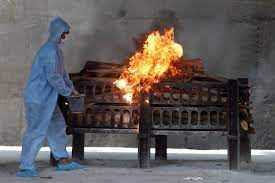 22-06-2021
22-06-2021
Will consider insurance cover to workers performing last rites of Covid victims, Centre tells SC

 Insurance Alertss
Insurance AlertssWill consider insurance cover to workers performing last rites of Covid victims, Centre tells SC
NEW DELHI: The Centre told the Supreme Court on Monday that it would consider granting insurance cover on the lines of other frontline workers to those working in crematoriums and helping conduct last rites of Covid victims, terming the issue a "valid concern".
A special vacation bench comprising Justices Ashok Bhushan and M R Shah, which reserved verdict on two pleas seeking ex-gratia compensation of Rs 4 lakh to the dependents of those who died of Covid, was told by lawyer Gaurav Kumar Bansal that the people working in crematoriums have been left without any insurance cover.
Bansal, who has filed one of the PILs on the issue, said the crematorium workers are getting infected and succumbing to the deadly disease. Solicitor General Tushar Mehta, appearing for the Centre, agreed to the enormity of the issue and said it was a “valid concern”. “It is a very valid concern. Crematorium members are not covered under the insurance scheme. I will take care of this aspect. Presently over 22 lakh healthcare workers are covered under the insurance scheme,” Mehta told the bench during the hearing conducted through video conferencing.
The government has already extended for one more year, starting from April 2021, the benefit of the 'Pradhan Mantri Garib Kalyan Insurance Scheme' of Rs 50 lakh to about 22 lakh healthcare professionals, he said. The top court, which asked the Centre whether NDMA, headed by the Prime Minister, has taken a decision not to pay Rs 4 lakh ex-gratia to families of victims of Covid, said that a uniform compensation scheme should be put in place as different amount being paid by different states would create heart burn among beneficiaries.
The bench's observations came when lawyer Sumeer Sodhi, appearing for four intervening applicants who had lost their family members to Covid, submitted that there cannot be any discrimination in the amounts being paid by different states to family members of those who had succumbed to the deadly infection. “There has to be a central scheme which has to be uniform for all victims,” he said, adding that the financial constraints cannot be a ground for the Centre to run away from its statutory duties to pay compensation.
Sodhi said some states pay higher sum in compensation and others pay less and this discrimination should not be allowed to remain and the Centre should frame a uniform policy under the Disaster Management Act. The bench observed that the Finance Commission's recommendations on dealing with disasters cannot override the statutory schemes on compensation under section 12 of the DMA.
However, it did not agree to the submission of a lawyer that the Centre under the DMA should give Rs 4 lakh as ex gratia to the families of the victims of the pandemic. “Every disaster is different. There can be small and big pandemics. Or a big flood or small food. If the standard or gravity of a pandemic is more, then you cannot say that the same standard can be applied for every disaster,” the bench said, adding that the submission can be that there must be a scheme.
Mehta said granting ex gratia is not the only thing, under the schemes of the Finance Commission, and measures have been taken to mitigate sufferings. “Everyone is entitled to 2kg rice and 5kg pulses as a part of food security. Enhancing oxygen production level was also under the Act. Even the free vaccination was also there under it,” Mehta said.
“We have to keep in mind that this is an ongoing process and instead of one-time relief on death, it is better if we go for multi-pronged preparedness,” he said.
Source: The Times of India
